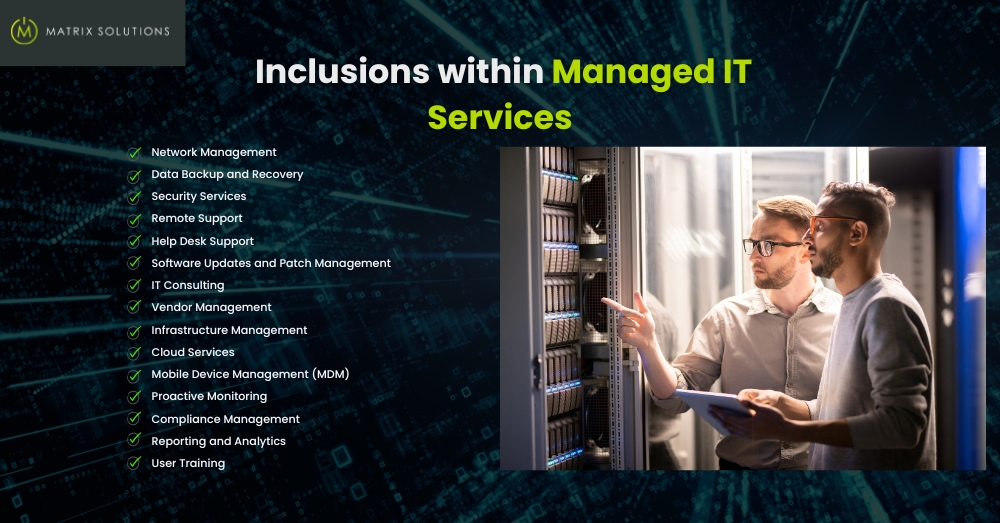Businesses today face the challenge of balancing innovation with effective IT infrastructure management. For this reason, Managed IT Services offers a strategic approach to handling the complexities of IT in today’s fast-paced era.
In this blog, we will explore ‘what is included in Managed IT Services,’ including the essentials, who provides them, and why they are indispensable for businesses of all sizes.
What are Managed IT Services?
Managed IT services involve partnering with a third-party provider to outsource specific IT functions and responsibilities. As a business owner, you have a lot of responsibilities to take care of. Managing your website, servers, and data security can be difficult, especially when you are also trying to provide top-notch customer support. Fortunately, there is a solution: Managed IT Services.
A Managed Service Provider (MSP) helps you monitor your servers, ensure website uptime, conduct regular security audits, and provide 24/7 technical support. By outsourcing these critical IT functions to experts, you can focus on your core business activities and leave the IT management to the professionals. This way, you can enjoy a reliable and secure online presence that will keep your customers happy and help your business grow.
Who Provides Managed IT Services?
Managed Service Providers (MSPs) offer managed IT services. They are a third-party company that remotely manages your business information technology (IT) infrastructure and services.
Explore the inclusions within Managed IT Services

Tailored to meet your business needs, managed IT services offer varying levels of support based on factors such as your business size, type, system complexity, and provider. By investing in managed IT services, you can typically gain access to the following:
- Network Management
- Data Backup and Recovery
- Security Services
- Remote Support
- Help Desk Support
- Software Updates and Patch Management
- IT Consulting
- Vendor Management
- Infrastructure Management
- Cloud Services
- Mobile Device Management (MDM)
- Proactive Monitoring
- Compliance Management
- Reporting and Analytics
- User Training
Network Management:
This service involves the continuous monitoring and administration of an organisation’s network infrastructure, ensuring optimal performance, security, and reliability. It encompasses the management of routers, switches, firewalls, and other network devices.
Data Backup and Recovery:
Managed IT services include regular data backups and comprehensive disaster recovery planning. This ensures that critical data is protected and can be swiftly restored in the event of data loss or system failures.
Security Services:
Managed IT services provide a suite of security measures to protect against cyber threats. This includes the implementation of antivirus and anti-malware solutions, security audits, and assessments to identify and address vulnerabilities.
Learn more about What is Managed Security Services?
Remote Support:
Organisations benefit from remote support services that enable quick issue resolution without the need for physical presence. This includes troubleshooting, problem resolution, and technical support delivered remotely.
Help Desk Support:
A dedicated help desk offers end-users a central point of contact for IT assistance. This service provides timely and efficient resolution of user issues, questions, and inquiries, contributing to overall operational continuity.
Software Updates and Patch Management:
Managed IT services include the systematic management of software updates and patches. This ensures that applications and systems are up to date with the latest security features and improvements.
IT Consulting:
Managed IT services often include strategic IT consulting, assisting organisations with technology planning, decision-making, and implementation. This helps align IT infrastructure with business goals.
Vendor Management:
This service involves coordinating and managing relationships with third-party vendors, ensuring that external services and products meet the organisation’s standards and requirements.
Infrastructure Management:
Managed IT services oversee the installation, configuration, and maintenance of servers and other IT infrastructure components, optimising performance and ensuring reliability.
Cloud Services:
Organisations benefit from managed cloud services for their cloud infrastructure, including support for cloud-based applications, migration assistance, and ongoing management of resources on platforms like AWS, Azure, Google Cloud, NetDocuments, worldox and many more.
Mobile Device Management (MDM):
This service involves the management of mobile devices within the organisation, ensuring security, monitoring, and control over smartphones, tablets, and other mobile endpoints.
Proactive Monitoring:
Continuous monitoring of IT systems helps identify and address potential issues before they impact operations. Proactive monitoring is a key component of managed IT services to maintain system health and performance.
Compliance Management:
Managed IT services assist organisations in adhering to industry-specific regulations and compliance requirements, ensuring that IT practices align with legal and regulatory standards.
Reporting and Analytics:
Regular reporting provides insights into the performance of IT systems and services. Managed IT services often include reporting and analytics to support informed decision-making.
User Training:
Training programs are offered to end-users to enhance their IT literacy and security awareness. This proactive approach contributes to a more secure and efficient use of IT resources within the organisation.
Why are Managed IT Services Important?
Managed IT Services are important for businesses to efficiently manage their IT infrastructure without needing in-house IT teams. In today’s competitive business environment, relying on break-fix maintenance is not viable. A reliable IT infrastructure is crucial for businesses to function smoothly. Moreover, managed IT services can reduce overall IT support costs by up to 50%. Outsourcing IT management allows you to expand your company while highly skilled MSPs (Managed Service Providers) care for your IT infrastructure.
Who is Managed IT Services for?
In recent years, managed IT services have gained popularity among businesses in various sectors due to their ability to outsource technology-related tasks. Whether running a startup, managing a large enterprise or a non-profit organisation, or overseeing critical operations in a government agency, Managed IT Services offer customised solutions to meet your needs. Let’s discuss in detail who will benefit the most from this:
1. Small and Medium-sized Enterprises (SMEs)
Small and medium-sized enterprises (SMEs) can increase productivity by outsourcing their IT needs to a Managed IT Services provider. By doing so, they can reduce the burden of managing complex technological operations and channel their efforts to their core business. The professionals will take care of all the technical aspects, giving the SMEs more time to focus on their growth and success.
Read our latest blog to discover the game-changing benefits of Managed IT Services for your small business.
2. Large Enterprises
As businesses grow, so do their IT needs. Managing complex IT ecosystems across different locations, departments, and technologies can be daunting for large enterprises. However, Managed IT Services provide a proactive and strategic approach to managing IT operations on a grand scale. They bring together a team of experts who can oversee and optimise various aspects of an enterprise’s IT infrastructure, including network management, cloud computing, data storage, cybersecurity, and more.
3. Non-profit Organisations
The passion for serving communities drives non-profit organisations, but they often require additional resources to achieve their goals effectively. One major challenge they encounter is the need for advanced technology infrastructure. Managed IT Services offer a cost-effective solution for non-profits to access cutting-edge technology without diverting scarce funds from their core initiatives. It ensures that these organisations maximize their impact in their communities.
4. Government Agencies
Government agencies must ensure that their essential services can operate smoothly and securely as our world becomes increasingly digital. With Managed IT Services, government agencies can maintain the integrity and continuity of their critical services, even in the face of unexpected disruptions. Managed IT Services providers offer reliable and effective solutions to ensure data security and operational efficiency for government agencies. They can also help these agencies comply with regulatory requirements and best practices, such as HIPAA, FISMA, and NIST.
Hire Matrix Solutions as Your Managed IT Service Provider
It’s no secret that today’s business landscape relies heavily on technology, and you need a partner you can trust to manage your IT needs seamlessly and efficiently. At Matrix Solutions, we know that the services are not a one-size-fits-all solution but a customisable toolkit. The experts at Matrix Solutions are seasoned professionals with years of experience managing diverse IT landscapes. Whether you need cloud services or strategic planning, our team has the expertise to handle it all. Plus, with our focus on security and strategic advancement, you can trust that we’ll help you stay ahead of the curve.
Partnering with Matrix Solutions is a straightforward process that can make all the difference in ensuring your business’s success. We offer a consultation to discuss your needs and explore how our services can elevate your IT infrastructure. Get in touch with us now and see how we can help you!
Optimise Your IT Infrastructure!
Discover the Key to Efficiency and Success With Matrix Solutions’ Managed IT Services.







